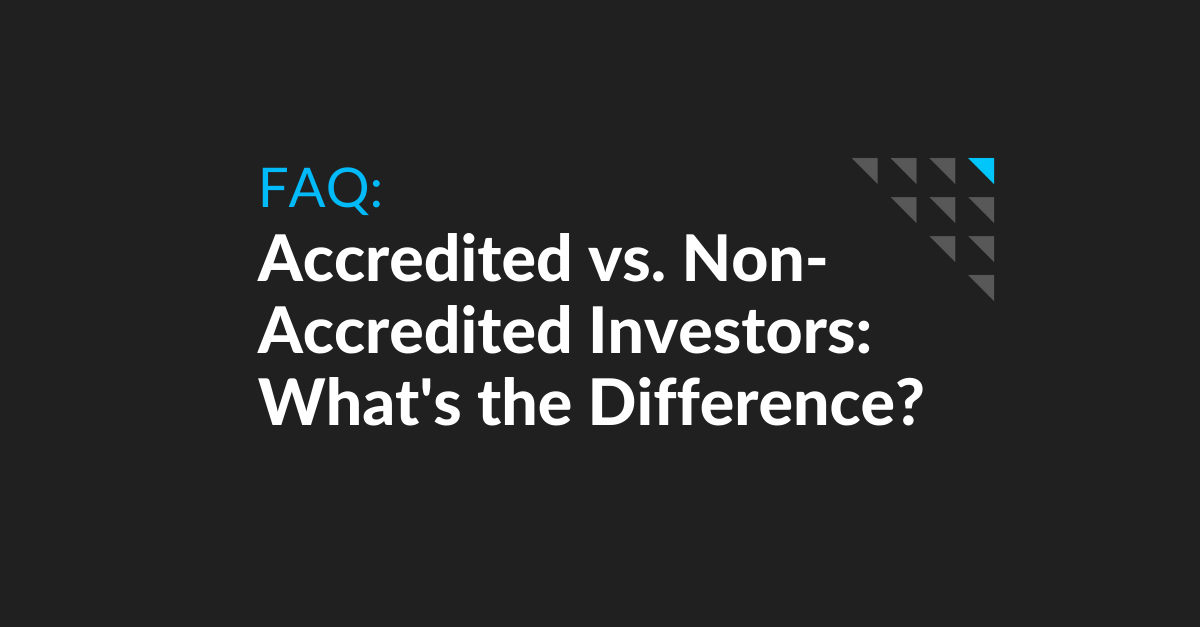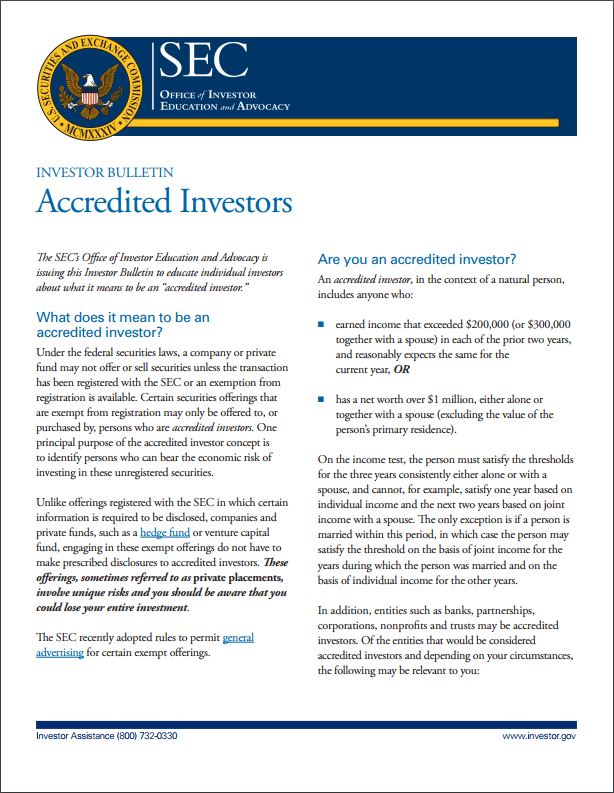All Categories
Featured
Table of Contents
An individual should have an internet well worth over $1 million, excluding the primary home (independently or with spouse or companion), to qualify as an approved financier. Demonstrating adequate education or task experience, being a registered broker or investment expert, or having specific professional qualifications can also qualify an individual as an approved investor.
Approved capitalists have access to investments not signed up with the SEC and can include a "spousal matching" when determining credentials. Recognized investors might face prospective losses from riskier investments and must prove financial sophistication to join uncontrolled investments (accredited real estate investing). Certified investor standing matters due to the fact that it establishes eligibility for financial investment opportunities not readily available to the public, such as exclusive positionings, financial backing, bush funds, and angel financial investments
Accredited Com

To participate, recognized financiers should approach the company of non listed protections, who may require them to complete a set of questions and supply monetary files, such as tax returns, W-2 kinds, and account declarations, to confirm their condition. Regulations for certified investors are supervised by the united state Securities and Exchange Payment (SEC), making sure that they fulfill particular financial and professional requirements.
This growth of the certified financier swimming pool is planned to keep investor security while supplying greater accessibility to unregistered investments for those with the essential economic sophistication and risk tolerance. - crowdfunding non accredited investors
Accredited Investor Markets
Realty syndication is rather similar to REITs because it additionally includes pooling resources to buy real estate investments. A syndication deal is when multiple investors merge their resources with each other to buy a solitary realty residential property. This deal is assembled by a syndicator, additionally known as the basic sponsor.
These investors will supply most of the capital required to acquire the building (investor law). If you think in the actual estate home being syndicated, you can sign up with as one of the passive investors.
These homes generate constant capital via regular monthly rental earnings. Additionally, these big homes are generally tougher to obtain as a single capitalist, which is why syndication is an excellent configuration. Financiers can get involved in multifamily genuine estate attaching a much lower minimum financial investment. The syndicator will certainly likewise be in cost of residential property monitoring, implying easy capitalists do not need to stress over becoming a landlord.
Accredited financiers do not need to accumulate rental revenue, deal with renters, handle emergency situations, spend money on fixings, and so on. Either the syndicator will employ a 3rd party home manager to do this or they will certainly manage it themselves - accredited. Each event in the multifamily syndication investment has a portion of the home.
This means capitalists get easy revenue from leas, and the eventual structure sales. This is based on what percentage of the building they own, depending on the deal framework.
Accredited Investor Definition 2021

Our point of views are our very own. A recognized investor is an individual or organization that can invest in uncontrolled safety and securities.
Unregistered protections are inherently dangerous but typically provide greater prices of return. If you've ever before found an investment readily available just to supposed accredited investors, you have actually most likely wondered what the term meant. The tag can relate to entities varying from huge financial establishments and well-off Ton of money 500 firms, right to high-earning houses and even individuals.
, granting market accessibility to smaller sized companies that may or else be squashed under the costs accompanying SEC enrollment.
They can likewise build up wealth, purchase real estate, build retirement profiles, take dangers, and reap incentives the largest difference is in the scale of these undertakings., and angel investing.
The SEC thinks about hedge funds a more "adaptable" investment method than something like shared funds, due to the fact that hedge funds use speculative methods like take advantage of (marketing to accredited investors) and brief marketing. Since these complex items require extra study and understanding, capitalists require to demonstrate that they understand the threats entailed in these kinds of financial investments prior to the SEC fits with them diving in
While several are mostly familiar with the SEC's customer security efforts, the regulatory authority's obligations are in fact twofold. To guarantee that those two initiatives aren't in conflict, it's sometimes needed for the SEC to match up high-risk, high-reward possibilities with appropriate investors.
How To Become An Accredited Investor Canada
One aids navigate the unregulated market, and the other will certainly float you to safety should the waves endanger. The average capitalist is risk-free on the beach or paddling in the shallows, safe under the watchful stare of the lifeguard (i.e., the SEC). Protections that are readily available to recognized financiers are provided via exclusive offerings, which may come with less laws than securities used to more routine financiers.
By Percent - January 11, 2021 When it comes to acquiring stocks and bonds, virtually anybody can spend. As long as you're over the age of 18 (or 21, in some states), not trading on inside information, or otherwise spending as component of a dispute of rate of interest, you can be a part of public markets whether you have $1 or $1 million.
Certain financial investment lorries consisting of those on Percent are only available to a class of investors legitimately defined as These investors have the specific authorization from governing bodies based on a slim set of requirements to spend in certain kinds of financial investments in private markets. That can be a certified financier? Much better yet, why are approved investors a point in the very first place?
The Securities and Exchange Payment (SEC) eventually took on policy 501 of Policy D, which defined who could spend in personal offerings and specified the term "accredited capitalist" a term that was later upgraded in 2020. A certified financier is anyone that meets any one of the adhering to requirements: Capitalists with earned earnings that exceeded $200,000 (or $300,000 with each other with a spouse) in each of the previous 2 years, and expects to fulfill the same standards in the present year.
Those that are "educated employees" of an exclusive fund. SEC- and state-registered financial investment advisors (however not reporting consultants) of these entities can likewise currently be taken into consideration accredited capitalists.
Authorized Investor

If you have an internet worth of over $1 million (not including your primary property/residence), made $200,000+ a year for the last two years, or have your Collection 7 certificate, you can make financial investments as a recognized investments. There are numerous various other credentials (as you can discover above), and the SEC intend on including a lot more in the close to future.
Because the early 1930s, federal government regulators have found it tough to shield investors secretive offerings and securities while concurrently sustaining the development of start-ups and various other young companies - business that numerous think are in charge of most of job growth in the United States - sec angel investor requirements. Balancing this job had actually been forefront of the mind of the Stocks and Exchange Payment ("SEC") for many years
Latest Posts
Do I Have To Pay Taxes On My Foreclosed Home
Tax Lien Investing Expert
Local Government Tax Sale